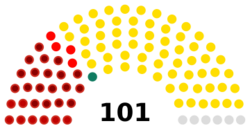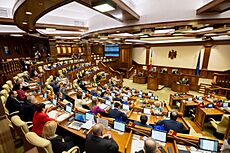Parliament of Moldova facts for kids
Quick facts for kids Parliament of the Republic of MoldovaParlamentul Republicii Moldova |
|
|---|---|
 |
|
| Type | |
| Type | |
| History | |
| Founded | 23 June 1991 |
| Preceded by | Supreme Soviet of the Moldavian SSR |
| Leadership | |
|
President of the Parliament
|
Igor Grosu, PAS
Since 29 July 2021 |
| Structure | |
| Seats | 101 |
 |
|
|
Political groups
|
Government (61)
Opposition (39)
|
|
Length of term
|
4 years |
| Elections | |
|
Last election
|
11 July 2021 |
|
Next election
|
28 September 2025 |
| Meeting place | |
 |
|
The Parliament of the Republic of Moldova (in Romanian, Parlamentul Republicii Moldova) is like the main meeting place where important decisions are made for the country. It's the only group that can create laws for Moldova. It has 101 members, called Members of Parliament (MPs), who are chosen by the people in elections every four years. These elections are fair and secret, meaning everyone's vote counts equally. The Parliament also chooses its own leader, called the President of the Parliament, who needs at least 52 votes to be elected.
Before an MP can start their job, a special court, the Constitutional Court, checks if everything was fair during their election. If election rules were broken, that person cannot be an MP. The Parliament starts its work within 30 days after an election. Even if a new election happens, the old Parliament keeps working until the new one is ready. During this time, they can't change the country's main rules (the Constitution) or make big new laws.
The most recent elections for the Parliament happened on July 11, 2021. In these elections, the Party of Action and Solidarity (PAS) won a lot of votes and became the biggest party in Parliament.
Contents
How the Parliament Works
The Parliament has a team of people who help it run smoothly every day. This team provides support with organization, information, and technology. They help the main leaders, committees, and all the MPs do their jobs. The Parliament itself decides how this team is set up and who works there.
Making Laws
The Parliament is the only group in Moldova that can create new laws. Anyone who is an MP, the President of the Parliament, or the Government can suggest a new law. When they have an idea for a law, they write it down as a 'draft paper' or 'legislative proposal' and present it to the Parliament for discussion and voting.
Working in Groups: Parliamentary Factions
To help organize their work, MPs often group together into 'parliamentary factions.' These groups are usually formed by members of the same political party. A faction needs at least 5 MPs. Even independent MPs (those not part of a party) can form a faction if there are enough of them. These groups are usually set up within 10 days after a new Parliament starts.
Who is in the Parliament Now?
The Parliament has 101 members. Here's how they are currently grouped, based on the elections on July 11, 2021:
| Group | Number of MPs |
|---|---|
| Party of Action and Solidarity (PAS) | 61 |
| Bloc of Communists and Socialists (BCS) | 26 |
| Victory | 9 |
| National Alternative Movement | 1 |
| Independents | 3 |
What Do Committees Do?
The Parliament divides its work among several special groups called 'committees.' Each committee focuses on a different important topic, like education, health, or the environment. This helps them study issues carefully and suggest the best laws. These committees are where a lot of the detailed work on new laws happens before they are voted on by all 101 MPs.
Here are the names of the main committees:
- Committee for Agriculture and Food Industry
- Committee for Culture, Education, Research, Youth, Sport and Mass-media
- Committee for Economy, Budget and Finance
- Committee for Environment, Climate and Green Transition
- Committee for Human Rights and Interethnic Relations
- Committee for National Security, Defense and Public Order
- Committee for Public Administration and Regional Development
- Committee for Social Protection, Health and Family
- Committee for Foreign Policy and European Integration
- Judicial Committee for Appointments and Immunities
- Committee for Public Finance Control
Permanent Bureau
The Permanent Bureau is a very important group that helps manage the Parliament's daily work. It includes the President of the Parliament and other key leaders.
- Igor Grosu – President of the Parliament (PAS)
- Doina Gherman – Vice President of the Parliament (PAS)
- Vlad Batrîncea – Vice President of the Parliament (BCS)
- Liliana Nicolaescu-Onofrei – PAS
- Veronica Roșca – PAS
- Lilian Carp – PAS
- Radu Marian – PAS
- Larisa Voloh – PAS
- Ion Groza – PAS
- Adrian Belîi – PAS
- Vladimir Odnostalco – BCS
- Corneliu Furculiță – BCS
- Constantin Starîș – BCS
Leaders of the Parliament
Here is a list of the people who have served as the President of the Parliament of Moldova:
- Alexandru Moșanu (September 4, 1990 – February 2, 1993)
- Petru Lucinschi (February 4, 1993 – January 9, 1997)
- Dumitru Moțpan (March 5, 1997 – April 23, 1998)
- Dumitru Diacov (April 23, 1998 – March 20, 2001)
- Eugenia Ostapciuc (March 20, 2001 – March 24, 2005)
- Marian Lupu (March 24, 2005 – May 5, 2009)
- Vladimir Voronin (May 12, 2009 – August 28, 2009)
- Mihai Ghimpu (August 28, 2009 – December 28, 2010)
- Marian Lupu (December 30, 2010 – April 25, 2013)
- Liliana Palihovici (acting; April 25, 2013 – May 30, 2013)
- Igor Corman (May 30, 2013 – December 9, 2014)
- Andrian Candu (January 23, 2015 – February 24, 2019)
- Zinaida Greceanîi (June 8, 2019 – July 29, 2021)
- Igor Grosu (July 29, 2021 – present)
The Parliament Building
The Parliament meets in a special building in Chișinău, the capital city. This building was constructed a long time ago, between 1976 and 1979. It's located on a famous street called Stephen the Great Boulevard. The building was designed by architects Alexander Cerdanțev and Grigore Bosenco. In 2009, the building was damaged during some public events, but it was repaired and restored between 2012 and 2013. The Parliament moved back into its beautiful, restored home in February 2014.
See also
 In Spanish: Parlamento de Moldavia para niños
In Spanish: Parlamento de Moldavia para niños



